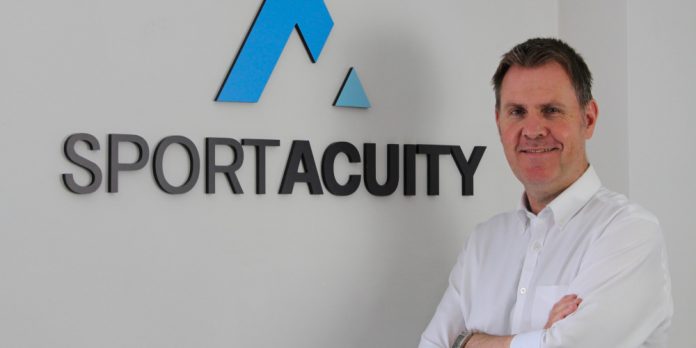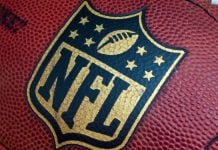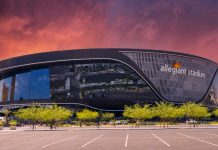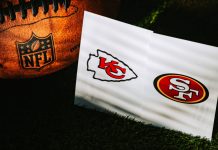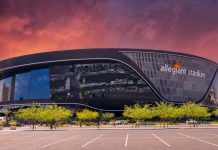Graham Shaw, co-founder of content and consultancy firm Sport Acuity, tees up the NFL’s $45bn gamble – a signal of how the US betting gold rush is really kicking off.
When the 2021 National Football League season kicked off last week, it ramped up even further the astonishing gambling ‘Gold Rush’ in the United States.
In the three years since the Supreme Court struck down PASPA and allowed states to make their own decisions on whether to legalise sports betting, a lot has happened.
More than 20 states are now ‘legal’, with several more ready to push the button, and we have an industry which Goldman Sachs estimates will grow to $39bn by 2033. Respected insiders believe even that gaudy estimate is conservative – they put it as high as $45bn.
Perhaps the biggest positive sign of all comes from the NFL – the most powerful sports league Stateside, with the most valuable product.
A decade ago, pro football was very much against sports betting – it would for example have been unthinkable for the league to put a franchise in Las Vegas. Yet here we are.
Michael McCarthy, Senior Writer for respected US sports business outlet Front Office Sports, explained: “The NFL was once the biggest opponent of sports betting. They’ve now done an about face – and view it as a big opportunity to recoup revenue lost from COVID-19.
“The league lost $4bn in 2020 due to the pandemic, with revenue falling to $12bn from $16bn.
“Now the league has signed a tri-exclusive deal with DraftKings, FanDuel and Caesars to make them the league’s official betting partners. Look for a tsunami of sports betting ads this fall as the league kicks off its 2021 season.”
Those landmark betting deals – inked back in April – mean US fans will get a new experience after Tom Brady’s Bucs locked horns with America’s Team the Dallas Cowboys to kick off the new season last Thursday night.
McCarthy outlined the sheer scale of the agreements, with the caveat that they could grow to be even bigger.
“These deals are worth an estimated $1bn over five years. But the league has opt-out clauses after the third and fourth years. So they could conceivably charge a lot more.”
While this is all ground-breaking stuff we are still only three years into legal sports betting, and as McCarthy points out, this is still just the start.
“Within five years, you will see sports betting parlors inside NFL stadiums – a la Wimbledon. It’s already happening in the NBA and the NFL will eventually follow suit. The money lost in the pandemic is only accelerating the trend.”
In recent weeks the NFL added to those initial betting partnerships – reaching further agreements with FOX Bet, PointsBet, BetMGM and WynnBet to take its partners up to seven.
The money, and the potential is off the charts – with 289 must-watch regular-season games, pro football is the perfect vehicle to drive the ‘Gold Rush’.
“Pro football, not baseball, is America’s national pastime,” said McCarthy.
“NFL games are the most-watched TV shows in all entertainment, not just sports programming. Super Bowl Sunday is America’s unofficial national holiday. Why? The NFL shrewdly used patriotism and manly values to present itself as the equivalent of war.
“The late great Frank Gifford of Monday Night Football also once told me that the NFL was the most perfect sport ever created for TV. It’s played on a rectangular field, matching your TV set. Often you can see all 22 players just before the nap.
“The whistles halting play are natural for commercial breaks. As TV exploded, so did the NFL.”
It is obvious that the ceiling for sports betting in the United States is enormous, but as ever the greatest opportunity also comes with the biggest challenge.
The battle for audience share is enormous in such a nascent market, and the sums of money being spent to acquire it are mind-boggling.
Penn National Gaming for example dropped a cool $163m in January to acquire a 36% stake in controversial media outlet Barstool, and more recently paid $2bn for sports news and data brand theScore. Notably, the latter had already launched its own sportsbook.
We have even seen that doyen of US media impartiality, the Associated Press (AP), sealing a deal to make FanDuel its exclusive provider of sports odds. Nothing is sacred any more.
The competition for customers is brutal, and Ed Andrewes – CEO of Atlantic City-based Resorts Digital Gaming – gave us a flavor of just how brutal.
He explained: “While the US sports betting market is highly lucrative, the challenge of establishing a new brand should not be underestimated.
“There are already a number of companies operating under well-known US brands – the likes of FanDuel and DraftKings through fantasy sports; Barstool and theScore through sports content and then BetMGM and HardRock through their existing gaming activities. Not only are these brands already established in the US but they are also spending hundreds of millions of dollars each year on marketing to compete with each other.
“The challenges around localisation of product and state-by-state regulation should not be underestimated, but they pale into insignificance compared to the investment required to gain any degree of share of voice in the market.”
Those issues presented by state-by-state regulation (think of the US as 50 separate countries, not just one) give operators and affiliates alike a unique headache when they enter the market.
One man who has seen that up close and personal is Joe Cundall, VP of Pricing Strategy & Customer Proposition for FOX Bet.
Previously a key figure at Sky Bet in the UK, Cundall is perfectly placed to assess the market differences – along with the opportunities and challenges. “As you’d expect, there’s a huge opportunity as the US Sports betting market opens up,” he said.
“The main challenge for any business is keeping pace with the rate at which states are passing legislation from a tech and product point of view.
“The biggest learning to date is the vast differences in customer, business and margin mix between each individual state. No two are the same and having the agility to quickly recognise, act and execute on the subtle changes and nuances between each territory will be key to success.
“The unique blend of educated bettors and potential recreational customers is also a delicate balance, and fulfilling a proposition that can cater to both (whilst not alienating the other) has also been a learning curve.”
The huge headache in licensing regulation is very real, something Cundall again has experienced at close hand.
“The process is not straightforward. In the same way that customer demographics differ by State, so do the various licensing and regulatory requirements.
“Having an internal resource that knows the landscape is absolutely crucial for keeping pace with the ever-changing nature of the US opportunity. If the required experience is lacking, then complying with the vast amount of rules and regulations can be a showstopper in terms of fundamentally getting started.
“Creating a trusting relationship with the state-by-state regulators is also a vital component to success, with each territory requiring slightly different actions. The channel of communication between operator and regulator is paramount to sustained forward momentum.”
It is no surprise against this background that there is a significant need in the marketplace for support from a compliance perspective.
ArdentSky LLC is the market leader in this space, and has been navigating the regulatory space for a string of high-profile clients since PASPA was struck down in May 2018.
Elliot Blatt, Chief Marketing Officer for ArdentSky, outlined the sheer scale of the challenge for entrants to the market, and how these challenges can be mitigated.
“Anybody who enters this sports betting market is blown away by the level of complexity. Getting a business set up to legally operate in one state is a major challenge. But then imagine doing it in 20, all the time responding to changes in those plus new ones opening up?
“What we’ve been able to do is automate and facilitate so many processes which otherwise just drain resources from our clients. We not only act as a buffer between them and the regulator, we also inform them and communicate. We act as the glue that holds everything together.
“The financial rewards here are astronomical if operators can gain audience share with the right product offering. But the back-room challenges from a compliance perspective should never be overlooked – they can be a major blocker to future success.”

